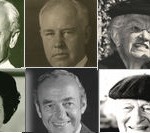June/2013
INTERVIEW… with VALDEI ARAUJO
When Prof. Valdei Araujo, historian from the Federal University of Ouro Preto, visited the offices of HCSM, we took the occasion to speak with him about the protests that have occupied the streets in cities across Brazil in recent weeks.
 You just gave a lecture on historical time as part of the project “Thursday meetings,” sponsored by the Graduate Program in the History of Science and Health at the Casa de Oswaldo Cruz. Many students raised the question of the protests. What do these demonstrations tell us about our current times?
You just gave a lecture on historical time as part of the project “Thursday meetings,” sponsored by the Graduate Program in the History of Science and Health at the Casa de Oswaldo Cruz. Many students raised the question of the protests. What do these demonstrations tell us about our current times?
Among historians of the present time, as well as those who are more concerned with theoretical questions, there is a lot of discussion about a certain abbreviation of the future, or deceleration of time. Put in simple terms, the argument is that the demise of a utopia and of the great political projects has left us with a society that changes and grows in terms of science and technology but that changes little politically or socially. Unlike past generations, where all actions were guided by a reasonably organized project for the future, today’s generation – again, according to this notion – no longer has the ability or will to think about a future that is very different from the present. When seen as a greater entrenchment of capitalism, the future becomes merely a matter of overcoming environmental, economic, and competitive challenges. At the same time, advances in the media and in the writing of history have afforded us an ever greater understanding of the past and have allowed us to cite this past and make ongoing use of it in the form of references or products. The protests now taking place put these descriptions to the test, but at their center there certainly lies a generation of young people that have grown up in a world with an eternal present and with a great historical supply in the form of cultural products. Today, a young person’s music collection compiles the entire musical heritage of the past few decades in one spot – which is not to say that these young people are aware of the historical horizons where this music was produced or that they are able to use these collections to think about an alternative future.
So do you think that utopia is back out on the streets?
Utopia, at least as we thought of it in modern times, was always based on some degree of certainty about the predictability of the future. This was quite apparent in the socialist utopia, which had a theory of society, economics, and reality that guaranteed that its achievement was not only possible but necessary. If vestiges of utopia, or of a social project, are still present in the protests of recent days, it’s quite different from its modern form, since we can detect no effort to lay the groundwork for a path to change. First and foremost, we see a desire to participate and to correct injustices, which is always a powerful driving force for mobilization, but we don’t see a desire for structured change or for a break with today’s means of reproduction. Many people seem to want nothing but this same world, simply more efficient and just – which does matter, without a doubt.
If it isn’t a utopia, then what motivates these people and keeps them protesting?
There’s certainly not one single answer to this question. The motivations are diverse and individual, and it would be pointless to try to describe them. Perhaps we can consider what the phenomenon of social networking has made possible. One of the more interesting impacts of Facebook is that it allows broad communication with a very large group of people who think much as we do. Despite the illusion of unlimited communication, Facebook works in growing circles of affinity that overlap at the edges. We usually talk to our closest friends and sometimes to our friends’ friends. This system of circles that partially overlap allows the emergence of large zones of consensus within our closest group and the dilution of differences as information floats to the edges. What I mean is that FB makes it possible to convoke thousands of people, without their differences of opinion or evaluations becoming so radical that unity of action is endangered. It seems like this network structure is reproduced at the protests themselves, in the sense that, unlike organized rallies or marches, there’s no attempt to transmit a discourse or voice that would try to represent the people gathered there. People are brought together as individuals or groups of affinity, but not in the traditional political sense. This can be a good thing, but it’s not clear to us how we can potentialize their positive aspects and dampen the various opportunistic uses of the events – attempts to lend the protests meaning in tune with specific agendas.
It’s natural that events like these would create an expectation for change, which finds expression in the phrase repeated by many – that Brazil has woken up. Has Brazil woken up?
One of the effects of our dissatisfaction with the freezing of our present time is the desire to identify these major, marking events. Like the classical historian, we want to be able to divide time into a before and an after, in an attempt to renew, to start over, and to acquire new energy. This feeling of living in an eternal present can be extremely tiring; just look at old folks today, who can no longer grow old but must seem forever young. It’s natural that we have an almost physical sense of renewal, especially while we’re experiencing the event and before the narratives that endeavor to tame it have yet to be devised. Observing these major events live, shared around the world in real time, has constantly fueled this sensation. Unfortunately, speaking to their “historical” importance and relevance is not within our grasp. As historians, more than narrating these events, we must live them intensely, which means experiencing them through living history, which is always bigger than our present.
Read more:
Editor experiences history in the streets, by Jaime Benchimol
Why I like Mondays, by Marcelo Badaró
José Murilo de Carvalho: the Brazilian people have woken up from their lethargy
Visit Prof. Valdei Araujo’s blog: valdeiaraujo.blogspot.com.br










